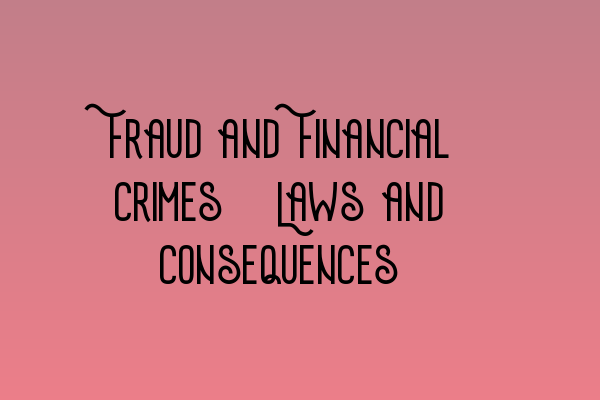Fraud and Financial Crimes: Laws and Consequences
Welcome to SQE Criminal Law & Practice Law UK! In this blog post, we will discuss the topic of fraud and financial crimes, specifically focusing on the laws and consequences associated with these acts. As a professional solicitor, it is important to have a thorough understanding of this area of law, as it has significant implications for both individuals and businesses.
The Definition of Fraud
Fraud, in legal terms, refers to the deliberate deception or misrepresentation of facts for personal gain or to cause harm to another party. It involves purposeful deceit and wrongful action, often taking place in the context of financial transactions. Fraud can take many forms, including identity theft, embezzlement, money laundering, and securities fraud, among others.
If you are preparing for the SQE exam, make sure to check out our article on SQE Exam Prep: Essential Study Materials for Aspiring Solicitors to ensure you have all the necessary resources to succeed.
Types of Financial Crimes
Financial crimes encompass a wide range of illegal activities that aim to defraud individuals or organizations. Some common types of financial crimes include:
- Bank fraud
- Credit card fraud
- Insurance fraud
- Investment fraud
- Tax evasion
- Forgery
Understanding the intricacies of these crimes and their associated laws is vital for any solicitor specializing in criminal law. Familiarize yourself with the Solicitors Qualifying Examination Format to ensure you are well-prepared for the exam.
Laws and Consequences
Financial crimes are considered serious offenses and are punishable under the law. The consequences of engaging in fraud or financial crimes can vary depending on the jurisdiction and the severity of the offense. In the UK, the penalties can range from fines to imprisonment, depending on the specific circumstances and the amount of money involved.
For international lawyers planning to take the SQE exam, it is crucial to understand the challenges and develop success strategies. Check out our article on SQE Exam for International Lawyers: Challenges and Success Strategies to gain valuable insights.
Preventing Financial Crimes
Prevention is key to combatting fraud and financial crimes. As a solicitor, it is important to advise individuals and businesses on best practices to protect themselves from becoming victims. This may include implementing effective internal controls, conducting regular audits, and promoting fraud awareness.
If you are an entrepreneur in the UK, consider incorporating an LLC to protect your personal assets. Follow our comprehensive step-by-step guide on LLC Formation Made Simple: Step-by-Step Guide for UK Entrepreneurs to navigate the process smoothly.
By understanding the laws surrounding fraud and financial crimes and staying up to date with any changes or developments, you can better serve your clients and contribute to a safer legal and business environment.
Conclusion
Fraud and financial crimes pose significant challenges to individuals, businesses, and society as a whole. As solicitors, it is our duty to stay informed, prevent such crimes, and provide effective legal representation when necessary. By mastering the laws and consequences associated with fraud, we can contribute to a fair and just society.
Thank you for reading this blog post from SQE Criminal Law & Practice Law UK. For more articles and resources, please explore our website.
